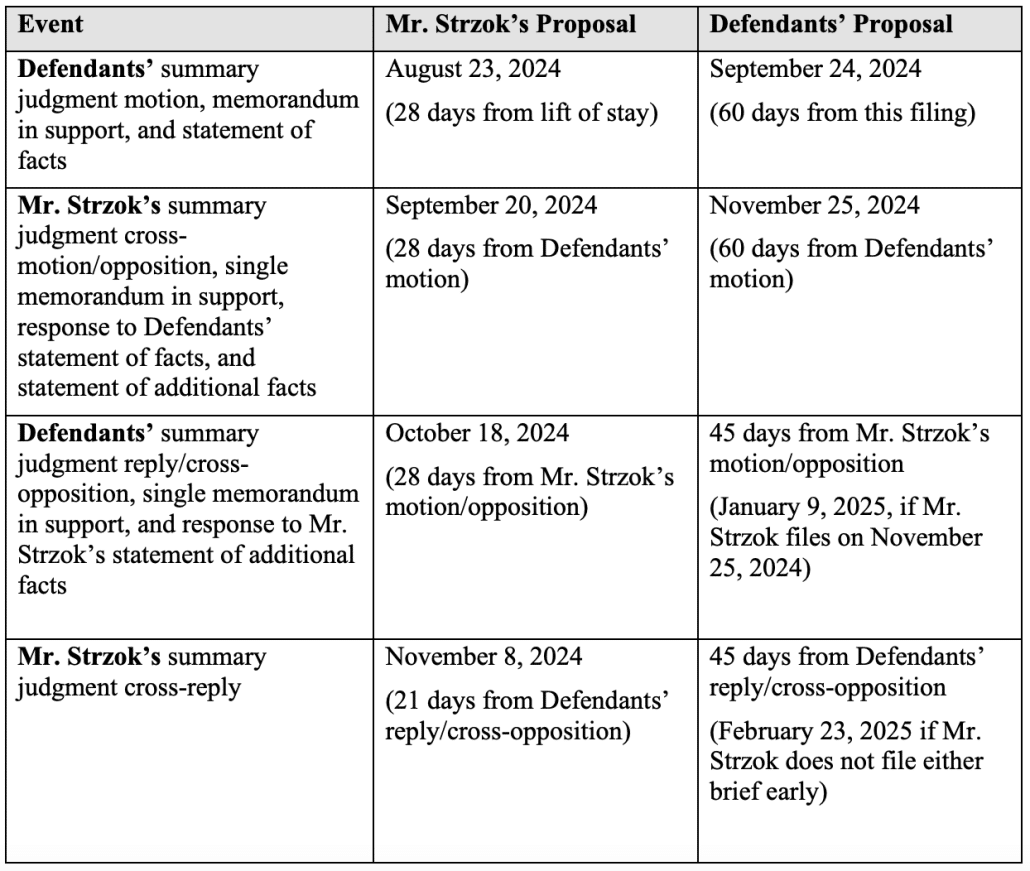DOJ Settles Privacy Act Lawsuit, Prepares for Peter Strzok’s Amended Complaint
Donald Trump is already furious with Christopher Wray — because he testified that Joe Biden retains his faculties, because he revealed that Trump might have been hit by a fragment of the bullet shot at him.
And now, because DOJ has begun to reverse Trump’s six year war on Peter Strzok.
Yesterday, DOJ settled the Privacy Act lawsuits of both Strzok and Lisa Page.
According to Politico, Strzok will get $1.2 million (of which $200,000 would be a downpayment if Amy Berman Jackson awards him anything further on his remaining claims) and Page will get $800,000.
On Friday, Strzok’s lawyers announced his $1.2 million agreement as attorneys for both sides notified a federal judge in Washington that the privacy-focused portion of that dispute was resolved.
[snip]
Page, who resigned amid the controversy, settled her own Privacy Act claim with the department Friday. Copies of the settlement agreements for Strzok and Page obtained by POLITICO indicate Page is to receive $800,000. The documents state that the U.S. government is not admitting or conceding legal liability.
Strzok has filed an amended complaint, with the Privacy Act violations redacted, leaving two more claims:
- Unlawful termination in violation of his First Amendment
- Violation of due process under the Fifth Amendment
But the two sides are apparently already fighting about what happens next, in part because DOJ provided discovery yesterday, seemingly showing that in 2022 (in the wake of the Andrew McCabe settlement), FBI instituted a new policy giving the Deputy Director authority to override a final settlement determination from Office of Professional Responsibility.
As an initial matter, Defendants produced additional documents just before 1:00 pm today, July 26th. Mr. Strzok is in the process of evaluating those documents and considering the impact of their belated production on testimony that was—and was not—obtained in this case. One of the documents is dated March 2022 and appears critical. It delegates from the FBI Director to the FBI Deputy Director the power to impose summary dismissals and to overrule disciplinary decisions issued by the FBI’s Office of Professional Responsibility (“OPR”). Mr. Strzok has long argued that the Deputy Director could not possibly overturn a binding last chance agreement executed between an employee and the FBI OPR Assistant Director acting for and on behalf of the FBI. Mr. Strzok has further argued that even if the Deputy Director could have had that power, he did not have it in 2018. Today’s production appears to confirm Mr. Strzok’s argument. Counsel for all parties conferred this afternoon regarding the potential remedies for this belated production, and the parties will continue to confer to determine whether a request for additional relief from the Court is necessary.
That would seem to help Strzok’s case, proving that when David Bowdich fired him, he was not permitted to override OPR.
More telling, DOJ wants to draw out briefing such that even if Strzok files right away, this won’t be fully briefed until after whoever wins in November is inaugurated.
Strzok argues that Amy Berman Jackson can rule in favor of his due process claim right away. The viewpoint discrimination claim, though, could get interesting, as there are allegedly other FBI agents who sent pro-Trump texts on their phones, with no discipline. And that’s where Strzok argues he’ll prove that he was fired because Trump demanded it.
[T]here is a significant dispute of material fact as to Deputy Director Bowdich’s rationale and motive for terminating Mr. Strzok’s employment. That disputed issue pins Bowdich’s version of events against a mountain of evidence indicating that he fired Mr. Strzok because of the demands of former President Trump and Bowdich’s own politics and interests.
But again, DOJ intends to push this out past the election (and these initial filings would be largely redacted under the protective order).
